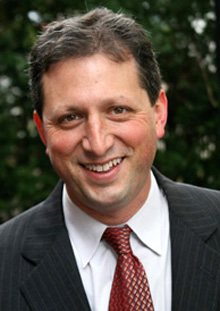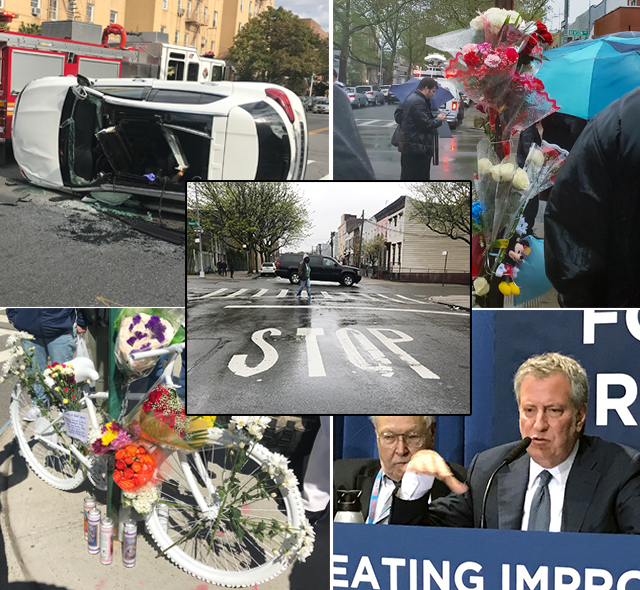Like many readers, we at Streetsblog have been keenly interested in Council Member Brad Lander's bill to impound vehicles that rack up five or more moving violations in any 12-month period — believing, as Lander does, that this is a prudent, easy way of getting repeat offenders off the roads. But "easy" doesn't mean simple. The bill has taken a long time to go from Lander's drafting table 13 months ago to, we hope, the mayor's desk. So to provide a transparent update on that process, Lander wrote the piece below to make sure all New Yorkers know where (and why) we stand:

We are facing an epidemic of traffic crash violence on our streets. While Vision Zero has helped to reduce the number of deadly crashes over the last several years, we have seen a spike in recent months. There have been more than 100 car-related fatalities so far this year, including 50-plus pedestrians, 15 cyclists (more than all of last year), and nine motorcyclists.
Just Monday, Maria Del Carmen Porras-Hernandez, a single mom with a 13-year-old daughter, was killed while walking in a crosswalk on Church and Coney Island Avenue by a driver who the police have charged with failure-to-yield. Being hit by a vehicle is the number one cause of injury-related death for children, and the number two cause for seniors in New York City. And another 4,000 New Yorkers are seriously injured by car crashes every year.
Many of you are rightfully calling for urgent action to hold drivers accountable for tragic collisions that are so often the result of dangerous driving behavior. I hear you when you say change is not coming fast enough.
So I wanted to let you know where we are with the proposed Reckless Driver Accountability Act, and talk about where we go from here.
The Reckless Driver Accountability Act would target the 1 percent most dangerous drivers in New York City, drivers who operate their cars like weapons aimed at their neighbors. You know them, because you see them out there driving with sociopathic recklessness. And the data makes it clear as well: a very small percentage of reckless drivers do disproportionate harm. The bill would create a program, based on the data from speed cameras and red light cameras, to identify cars with multiple repeated violations, with the goal to make their owners change their driving before they kill or injure someone, or impound their cars if they won’t.
I introduced the Reckless Driver Accountability Act last year after the horrific crash at Fifth Avenue and Ninth Street in which a reckless driver killed two young children (and based on the ideas and analysis of a team of advocates). Because the law is built on our speed camera program, we needed to get that program restored and expanded first (which finally happened at the end of March, thanks again to tireless advocacy).
Over the past three months, we’ve held five meetings with City Hall, the Speaker’s Office (Speaker Corey Johnson is a strong supporter) and Council legal staff, the Department of Transportation, the Law Department, the Sheriff, the NYPD, researchers from the University of Chicago, and advocates to discuss how to best design and implement this accountability program.
We are working to make sure that the program is grounded in data, on sound legal footing, is both appropriately severe for the worst offenders and also grounded in restorative justice, and possible to implement. Here are some of the issues we’ve made progress on:
Data: Forthcoming analysis by researchers from the University of Chicago working with DOT (looking at the connection between camera violations and crashes) suggests that repeat offenders are much more likely to cause crashes. This seems obvious, but data is needed for good policy.
Legal grounding: Due process is required before you impound someone’s property. So we will modify the program to incorporate the opportunity for a legally required hearing — or, as an alternative, a Driver Accountability Program shown to change driving behavior in many cases — before a car is impounded. The Law Department agrees we are not preempted by state law.
Implementation/towing: The Sheriff (rather than the NYPD) would likely be responsible for impoundment of qualifying vehicles. While the NYPD is responsible for towing an in-process violation (e.g. a car parked in a bike lane), it is the Sheriff who deals with scofflaws and could therefore better address repeat offenders (e.g. he has a fleet with license-plate scanners that search for offending vehicles). We are working with his office to define the appropriate seizure process and ensure that there is sufficient capacity in the tow lots.
Driver Accountability Course: We are fortunate to build on the experience of the Driver Accountability Program operated by the Center for Court Innovation, which my office worked with Families for Safe Streets and Transportation Alternatives to create a few years ago. Preliminary analysis shows a 40-percent reduction in recidivism, and meaningful change in driver behavior. DOT would contract to build upon this work for the citywide program. Reckless drivers would be required to pay for the course (with an exception for those who cannot afford it).
Threshold: We are working to define the right threshold for defining recklessness. Because the city is dramatically expanding the speed camera program to help reduce speeding, the number of tickets will rise. So we need to leave room for the DOT to adjust the threshold as the program evolves to continue to target the top 1 percent of reckless drivers. We are also discussing what to do about those who take the Driver Accountability Program but do not change their behavior — and at what threshold we should take those cars permanently.
Through these meetings, I am optimistic that we are near consensus with the de Blasio Administration on how to move forward. We will have a new draft of the bill in the coming weeks, and I believe we will be able to move forward to pass it this fall.
That does not mean advocates should relent in their pressure. I wanted to give you a detailed and transparent update on where we are — but real change only happens through both hard work inside and strong pressure outside. If you want to express your support, you can sign the petition for the Reckless Driver Accountability Act, and share it with others. And by all means, keep tweeting at/calling me, my colleagues, and the Mayor until we get it done.
Holding the most reckless drivers accountable for their driving behavior is an urgent step — and one no city has yet taken — but is just one piece of the safe streets puzzle. More work is needed to bring us anywhere close to the zero in Vision Zero.
The cyclist community is still reeling from a spate of three fatal crashes in just seven days. After a truck killed 20-year-old Robyn Hightman on June 24, the NYPD reverted to ticketing cyclists instead of cracking down on reckless drivers. Just days later, after two more people were fatally struck, the mayor finally announced a crackdown on parking in bike lanes. We all know that this is not enough.
Redesigning streets and intersections constructed with only cars in mind is critical to making our city safer for everyone. We are making some progress, but for those who have lost loved ones to traffic violence, for those who commute daily by bicycle on dangerous streets, none of this is coming fast enough. That’s why I support Speaker Johnson’s bill for dramatic increases in protected bike and bus lanes, thousands of safer intersections, and a comprehensive plan to transform our streets.
I look forward to continuing to work together to pass legislation to hold drivers accountable that enhances safety, while ensuring equity and due process.
Brad Lander is a council member representing Park Slope, Windsor Terrace and Kensington in Brooklyn.






